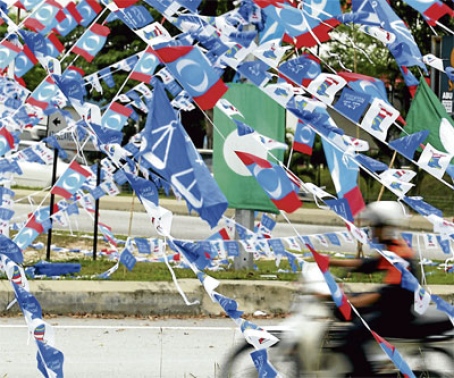Mark of a leader
Professor Tan Sri Dato' Dzulkifli Abdul Razak
Learning Curve: Perspective
New Sunday Times - 14-04-2013
A MOTIVATIONAL poster reads "Leadership is action, not position". Too bad for those who think that leadership is about warming seats and shouting out orders. On the contrary, it is about rolling up the sleeves and springing into action to build and not to destroy.
Many are bent on wiping out what has been built over the years under the guise of personal legacy, or they merely want to be in action by being destructive.
Some analysts say this is a clear sign of the lack of leadership, especially when the word "action" is understood in transformational terms underpinned by a strong leadership style.
This type of leadership creates positive vibes all around and inspires action in which the interest of the larger community or nation overrides that of an individual.
After all, an in-depth definition of leadership that is fast emerging relates to the ability "to organise a group of people to achieve a common goal".
There is no room for personal agenda at the expense of the greater whole and what have been built collectively.
This style of leadership allows the leader to enhance the morale and performance of his team of followers according to James MacGregor Burns' concept of transformational leadership in his book Leadership (1978).
The late American author Stephen Covey added that transformational leadership is preoccupied with purposes and values, morals and ethics.
It is oriented towards long-term goals without compromising human values and principles.
Moreover, it is able to identify and develop new talents by giving them challenges in creating the change.
Good leaders are more than great bosses who are aplenty. This point is well highlighted in Rajeev Peshawaria's Too Many Bosses, Too Few Leaders (2011). Rajeev introduces three core principles which are the foundation of the best leadership. They are: great leaders clearly define their purpose and values; nobody can motivate another person because everyone comes pre-motivated; and a leader's job is not to directly produce results but to create the conditions that will harness the energy of others.
Lao-Tzu makes a distinction between different types of leaders when he says: "As for best leaders, people do not notice their existence." When the best leader's work is done, people say "we did it ourselves!".
This takes the discussion to another level where the element of "action" is so sublime and spontaneous that it is seen as work done in sync with one another. It is about earning respect rather than demanding it.

The poster war along a road in Section 19 Shah Alam signals that the general election is just around the corner.
This is in stark contrast to the type of leadership that is preoccupied with position and control, yielding to the power of politics.
It is more about taking action to impress rather than creating a truly transformational change to serve a higher purpose. This behaviour is often predicated upon the superficiality of instant fame.
The tendency is towards immediate gratification or ego-building. Former United States Secretary of State Collin Powell says: "Avoid having your ego so close to your position that when your position falls, your ego goes with it."
Unfortunately, this type of leadership can be deceiving because it fulfils the expected roles although it is devoid of any meaningful change. It is based on patronage instead of principle.
Charisma, while important, often masks the true nature of leadership. One cannot help but think of Adolf Hitler as a case in point. We need to be aware of pseudo-transformational leadership where the elements of ethical and moral virtues are in deficit.
Such leaders have no qualms about using whatever means to meet their selfish interest and aspirations.
To put this in the context of the elections that is just around the corner, each so-called "winnable" candidate must be a potential transformational leader with a proven track record of "actions" to uplift the quality of life of the majority.
Armed with this awareness, hopefully the ballot that is about to be cast in this election will be a more meaningful one! Let us exercise our right to vote and make a difference!
- The writer is the vice-chancellor of the Albukhary International University
